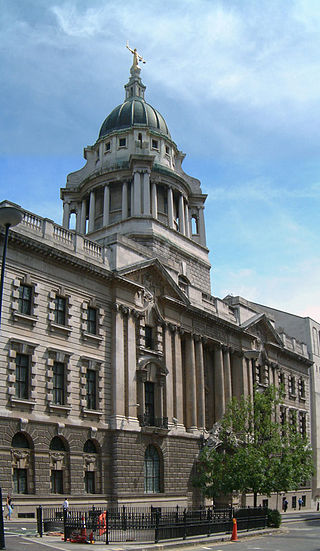Negligence is a failure to exercise appropriate and/or ethical ruled care expected to be exercised amongst specified circumstances. The area of tort law known as negligence involves harm caused by failing to act as a form of carelessness possibly with extenuating circumstances. The core concept of negligence is that people should exercise reasonable care in their actions, by taking account of the potential harm that they might foreseeably cause to other people or property.
The business judgment rule is a case-law-derived doctrine in corporations law that courts defer to the business judgment of corporate executives. It is rooted in the principle that the "directors of a corporation... are clothed with [the] presumption, which the law accords to them, of being [motivated] in their conduct by a bona fide regard for the interests of the corporation whose affairs the stockholders have committed to their charge". The rule exists in some form in most common law countries, including the United States, Canada, England and Wales, and Australia.

Hedley Byrne & Co Ltd v Heller & Partners Ltd [1964] AC 465 is an English tort law case on economic loss in English tort law resulting from a negligent misstatement. Prior to the decision, the notion that a party may owe another a duty of care for statements made in reliance had been rejected, with the only remedy for such losses being in contract law. The House of Lords overruled the previous position, in recognising liability for pure economic loss not arising from a contractual relationship, applying to commercial negligence the principle of "assumption of responsibility".
In tort law, the standard of care is the only degree of prudence and caution required of an individual who is under a duty of care.

Home Office v Dorset Yacht Co Ltd[1970] UKHL 2, [1970] AC 1004 is a leading case in English tort law. It is a House of Lords decision on negligence and marked the start of a rapid expansion in the scope of negligence in the United Kingdom by widening the circumstances in which a court was likely to find a duty of care. The case also addressed the liability of government bodies, a person's liability for the acts of third parties that he has facilitated, and liability for omissions.

Caparo Industries PLC v Dickman[1990] UKHL 2 is a leading English tort law case on the test for a duty of care. The House of Lords, following the Court of Appeal, set out a "three-fold test". In order for a duty of care to arise in negligence:
In the English law of tort, professional negligence is a subset of the general rules on negligence to cover the situation in which the defendant has represented him or herself as having more than average skills and abilities. The usual rules rely on establishing that a duty of care is owed by the defendant to the claimant, and that the defendant is in breach of that duty. The standard test of breach is whether the defendant has matched the abilities of a reasonable person. But, by virtue of the services they offer and supply, professional people hold themselves out as having more than average abilities. This specialised set of rules determines the standards against which to measure the legal quality of the services actually delivered by those who claim to be among the best in their fields of expertise.

Bartlett v Barclays Bank Trust Co Ltd [1980] 1 Ch 515 in an English trusts law case. In it Brightman J gave a comprehensive discussion of the duties of trustees in connection with companies whose shares are part of the trust property. Although it is common to hear lawyers refer to "the rule in Bartlett v Barclays Bank", the case only restated law that had been accepted since Speight v Gaunt.

In re Caremark International Inc. Derivative Litigation, 698 A.2d 959, is a civil action that came before the Delaware Court of Chancery. It is an important case in United States corporate law and discusses a director's duty of care in the oversight context. It raised the question regarding compliance, "what is the board's responsibility with respect to the organization and monitoring of the enterprise to assure that the corporation functions within the law to achieve its purposes?" Chancellor Allen wrote the opinion.
Re D’Jan of London Ltd [1994] 1 BCLC 561 is a leading English company law case concerning a director's duty of care and skill, whose main precedent is now codified under Section 174 of the Companies Act 2006. The case was decided under the older Companies Act 1985.

Armitage v Nurse [1997] EWCA Civ 1279 is the leading decision in English trusts law concerning the validity of exemption clauses. The Court of Appeal held that in English law trustee exemption clauses can validly exempt trustees from liability for all breaches of trust except fraud. Millet LJ gave the leading judgment.
Re Cardiff Savings Bank [1892] 2 Ch 100, often called the Marquess of Bute's case is a UK company law case concerning the duty of care owed by members of the board. It is old law but is still often mentioned as an extreme example of to what extent a "subjective" duty of care allowed directors to escape consequences of their negligence.

Candler v Crane, Christmas & Co [1951] 2 KB 164 is an English tort law case on negligent misstatement.

Learoyd v Whiteley[1887] UKHL 1 is an English trusts law case, concerning the duty of care owed by a trustee when exercising the power of investment.

Speight v Gaunt [1883] UKHL 1 is an English trusts law case, concerning the extent of the duty of care owed by a fiduciary.

Oldham v Kyrris[2003] EWCA Civ 1506 is a UK insolvency law case concerning the administration procedure when a company is unable to repay its debts.

Re Charnley Davies Ltd [1990] BCLC 760 is a UK insolvency law case concerning the administration procedure when a company is unable to repay its debts. It held that an administrator would only breach a duty of care if an ordinary, skilled practitioner would have acted differently.

Downsview Nominees Ltd v First City Corp Ltd [1992] UKPC 34 is a New Zealand insolvency law case decided by the Judicial Committee of the Privy Council concerning the nature and extent of the liability of a mortgagee, or a receiver and manager, to a mortgagor or a subsequent debenture holder for his actions.

Cuckmere Brick Co v Mutual Finance[1971] EWCA Civ 9 is an English tort law case, establishing the lender must publish/promote the materially beneficial key, intrinsic facts as to land in mortgage repossession sales. As it affects the duty of mortgagees, to that extent it can be considered within the periphery of English land law also.

Multinational Gas and Petrochemical Co v Multinational Gas and Petrochemical Services Ltd [1983] Ch 258 is a leading United Kingdom company law case relating to directors' liability. The case is the principal authority for the proposition that a company cannot make any claim against a director for breach of duty if the acts of the director have been ratified by the members of the company.










